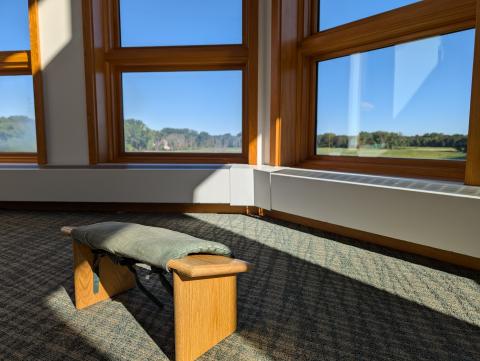A lot of people reach a point where eating well and working out just don’t cut it. The body stays capable, but something feels off. Stress piles up, sleep gets worse, or patience runs thin. You might still show up at work, in the gym, or for your family, but a part of you knows there’s more to life than pushing through.
That was me. I thought I was taking care of my body, but I needed some relief from tension and stress. I wanted to feel steady again, not strung tight so often.
When Strength Wasn’t Enough
In graduate school, I felt a lot of stress. Exams such as my Master’s “comps,” PhD “prelims,” and dissertation defense felt like a test of my worth. Most of my classmates managed the pressure with prescription drugs. I tried SSRIs like Prozac, Zoloft, and Celexa. None of them helped much.
Years later, while parenting our young kids, the same pressure came back. This time I turned to yoga, but mostly for the physical benefits, such as strength, flexibility, and recovery. Meditation still seemed like something “other people” did. For years, I pretended to meditate in yoga class.
And then I had a panic attack so severe I ended up in the ER, barely able to walk. That was a tough night.
A few years later, when my wife was diagnosed with cancer, everything changed. I feared that I wouldn’t be able to show up for her, or for our kids, if I fell apart inside. That was the moment I realized I needed something deeper. I started meditating.
Seeking Results
At first, I treated meditation like another experiment. Sit, breathe, wait for results. But that’s not how it works. You show up. You stay with what’s there. You breathe through it.
Over time, meditation seemed to reshape my nervous system. It became the most effective practice I’d ever tried. More powerful than medication, therapy, yoga, biking, or journaling. It worked because it trained me to pause before reacting, to feel stress in real time instead of being swept away by it.
The Comment That Changed Everything
One afternoon, I overheard my daughter talking to her friend. Her friend said it was a little weird that her dad meditated. Without missing a beat, my daughter said, “Oh, it’s okay. Now he doesn’t yell at the dogs.”
I remember feeling totally taken aback by my daughter’s response. I had started meditating so I could stay grounded through my wife’s treatment. But my daughter noticed something smaller. She was right. “Huh,” I thought. I no longer yelled when the dogs had accidents or tore something apart. She noticed calm where there used to be reactivity.
At the time, I had practiced a lot of loving-kindness meditation, sometimes sending kind thoughts toward our two greyhounds. I didn’t expect that to have much of an effect. But apparently, it did.
That moment my daughter taught me what meditation teachers mean when they say, “Don’t focus on results. Just practice.” You think you’re meditating to handle the big things, but the first changes often show up in small ways.
Everyday Practice, Everyday Peace
After that, I started to notice shifts in ordinary moments. Before meditation, I used to fume while shoveling snow or clearing leaves, lost in thoughts like, “Why doesn’t anyone else help?!” or “This suuuucks!”
After I started a daily meditation practice, those same chores became quiet, almost meditative. On the days I was present, the air felt crisp. The snow looked beautiful. Shoveling became another way to move, breathe, and to enjoy nature.
Meditation didn’t erase stress or make life perfect. It gave me space. It turned the noise down enough that I could meet the moment instead of fighting it. (And by the way, my wife has been cancer-free and healthy for many years.)
A Steady Path Forward
It took years for me to find meditation, but once I did, it became a daily anchor. It’s now part of everything I teach. I don’t view it as an escape from stress, but rather as a way to live with awareness and compassion.
If you’ve been thinking about trying meditation, start small. Sit quietly for a few minutes. Feel your breath. Notice what happens when you don’t rush to fix or fight what you feel. You might find that calm begins where effort ends.
If you’d like some guidance, I’m leading a free 5-week meditation group starting tomorrow, Tuesday, October 21. Each week we’ll explore practical ways to rest the body, calm the mind, and reconnect with what matters most. Come for one evening or the whole series. The group is free, but registration is required due to space limitations.

Comments